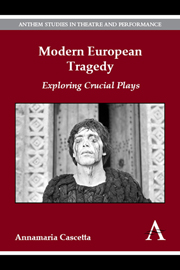Book contents
- Frontmatter
- Dedication
- Contents
- Acknowledgements
- Introduction: The Tragic, Tragedy and the Idea of the Limit
- Chapter 1 Hubris and Guilt: Gengangere (Ghosts)
- Chapter 2 Eve Becomes Mary: L'annonce faite à Marie (The Tidings Brought to Mary)
- Chapter 3 The School of Hatred: Mourning Becomes Electra
- Chapter 4 The Destiny of Man Is Man: Mutter Courage und ihre Kinder (Mother Courage and Her Children)
- Chapter 5 The Tragic and the Absurd: Caligula
- Chapter 6 Dianoetic Laughter in Tragedy: Accepting Finitude: Endgame
- Chapter 7 The Arrogance of Reason and the ‘Disappearance of the Fireflies’: Pilade (Pylades)
- Chapter 8 The Apocalypse of a Civilization: From Akropolis to Apocalypsis cum figuris
- A Provisional Epilogue: Between the Experience and the Representation of the Tragic: Towards a Performative Theatre
- Appendix: Chronology of Productions
- Notes
- Index
Chapter 4 - The Destiny of Man Is Man: Mutter Courage und ihre Kinder (Mother Courage and Her Children)
Published online by Cambridge University Press: 05 September 2014
- Frontmatter
- Dedication
- Contents
- Acknowledgements
- Introduction: The Tragic, Tragedy and the Idea of the Limit
- Chapter 1 Hubris and Guilt: Gengangere (Ghosts)
- Chapter 2 Eve Becomes Mary: L'annonce faite à Marie (The Tidings Brought to Mary)
- Chapter 3 The School of Hatred: Mourning Becomes Electra
- Chapter 4 The Destiny of Man Is Man: Mutter Courage und ihre Kinder (Mother Courage and Her Children)
- Chapter 5 The Tragic and the Absurd: Caligula
- Chapter 6 Dianoetic Laughter in Tragedy: Accepting Finitude: Endgame
- Chapter 7 The Arrogance of Reason and the ‘Disappearance of the Fireflies’: Pilade (Pylades)
- Chapter 8 The Apocalypse of a Civilization: From Akropolis to Apocalypsis cum figuris
- A Provisional Epilogue: Between the Experience and the Representation of the Tragic: Towards a Performative Theatre
- Appendix: Chronology of Productions
- Notes
- Index
Summary
The form of tragedy and the traditional mode of expressing man's tragic condition in the theatre were, as is well known, some of Bertolt Brecht's most controversial targets. There are two sets of reasons for this. The first is technical, because classical tragedy and the drama that derives from it belong, as Brecht saw it, to a kind of theatre that does not arouse the critical spirit and the dialectical attitude. The second is philosophical, because they are founded on an idea of destiny and the immutability or universality of human thought, in conflict with Brecht's Marxian principles.
The limit that weighs on life (which Brecht embraced as an object of great love and inexhaustible pleasure, which fascinated him and to which he devoted his life's work) was not so much a natural limit as that entailed by people's responsibility towards others. It was Marx who provided him with the insight into this vital issue for modernity, and Brecht started from this. This point of view constitutes a significant change from that of the works we have examined so far. The limit is bound up with poverty and oppression. It is based on exploitation. It is not predestined and unavoidable, but historical and changeable. Accepting the idea of destiny means accepting one form of alienation which Marx analysed and rejected, that of an absolute, when humanity forgets its only home is the earth.
- Type
- Chapter
- Information
- Modern European TragedyExploring Crucial Plays, pp. 59 - 74Publisher: Anthem PressPrint publication year: 2014

